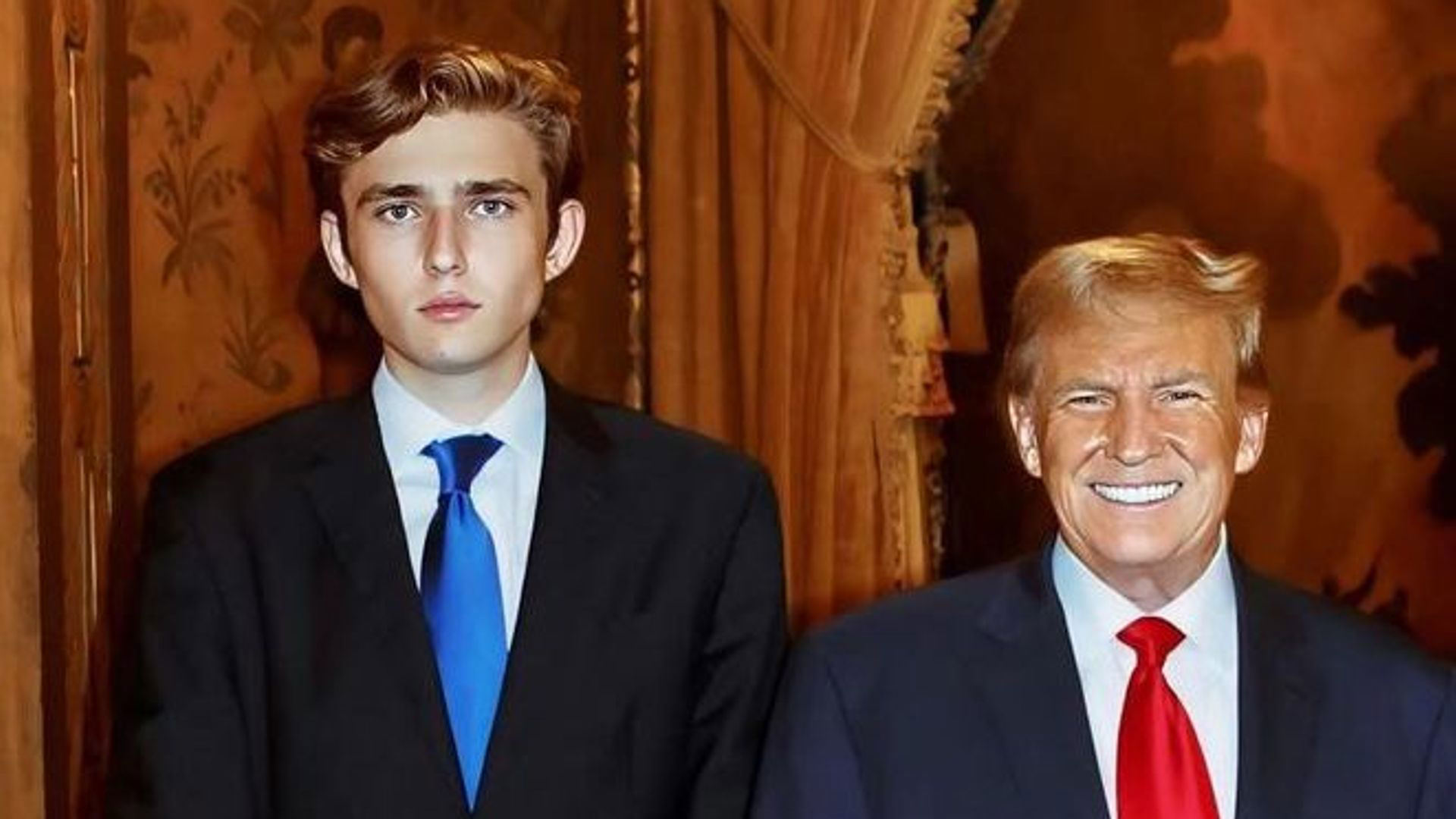Is Barron Trump The Antichrist? Unveiling Theories & Evidence
Is Barron Trump, the youngest son of former President Donald Trump, the Antichrist? The very notion, fueled by speculation and conspiracy theories, is a potent reminder of the enduring power of apocalyptic anxieties in contemporary society. The idea, circulating primarily online and among certain fringe groups, taps into deeply ingrained fears about the end times and the rise of an evil figure who will usher in a period of tribulation before the final judgment. This piece examines the origins and proliferation of this claim, analyzes the theological and cultural contexts that give it traction, and assesses the potential consequences of such narratives.
The claim that Barron Trump is the Antichrist is, at its core, a manifestation of societal unease and distrust. It reflects a tendency to scapegoat individuals and project onto them the anxieties of a complex and often confusing world. The Antichrist, as a concept, offers a convenient embodiment of evil, a figure against whom the "good" can be defined and defended. This narrative, however, is not new. Throughout history, various individuals and groups have been accused of embodying the Antichrist, often coinciding with periods of political upheaval, economic hardship, or religious tension. The current resurgence of such claims surrounding Barron Trump warrants a closer look, not only to understand the specific context that has given rise to it, but also to consider the broader implications for civic discourse and the spread of misinformation.
| Attribute | Details |
|---|---|
| Full Name | Barron William Trump |
| Date of Birth | March 20, 2006 |
| Place of Birth | New York City, New York, USA |
| Parents | Donald Trump and Melania Trump |
| Siblings | Donald Trump Jr., Ivanka Trump, Eric Trump, Tiffany Trump |
| Education | Attended Columbia Grammar & Preparatory School, St. Andrew's Episcopal School (currently) |
| Public Profile | Limited; primarily appears at public events with his family. |
| Residence | Mar-a-Lago, Palm Beach, Florida; occasional stays at Trump Tower, New York City |
| Known For | Being the youngest child of Donald Trump, his infrequent public appearances, and his private life. |
| Noteworthy | His presence has been a subject of media interest and speculation, especially during his father's presidency. |
| Hobbies and Interests | Little is publicly known about his personal interests, but it is reported he enjoys sports and other typical activities for his age. |
| Current Status | He is currently a student in high school. |
| Reference | Wikipedia: Barron Trump |
The origins of the "Barron Trump is the Antichrist" narrative appear to be rooted in a combination of factors. One significant element is the enduring fascination with prophecy and eschatology, the theological study of the end times. Many religious traditions, particularly within Christianity, feature elaborate prophecies about the Antichrist, a figure who will appear before the Second Coming of Christ. These prophecies often describe the Antichrist as charismatic, deceptive, and possessing immense power, characteristics that can be readily applied to public figures, especially those in positions of political influence. This interpretation, however, overlooks the context of biblical prophecy. Prophetic texts are rarely meant to be taken literally, and have evolved over the centuries as they adapted to each generation.
Furthermore, the widespread availability of social media and online platforms has significantly contributed to the spread of this claim. These platforms provide a space for the rapid dissemination of information, both accurate and inaccurate, and allow individuals to connect with others who share similar beliefs. Conspiracy theories, once relegated to the fringes of society, can now quickly gain traction and reach a vast audience. Algorithms, designed to maximize user engagement, can inadvertently amplify these narratives by connecting users with content that reinforces their existing biases. The anonymity afforded by the internet also encourages the spread of unverified information, as individuals may feel less accountable for the claims they make online than they would in face-to-face interactions.
The media's portrayal of Barron Trump has also played a role. While he has, by and large, been shielded from the intense scrutiny that his older siblings and father have faced, his relative youth and privacy have also made him an object of curiosity. His few public appearances, often captured by photographers and videographers, have been dissected and analyzed, sometimes with unwarranted attention. The lack of readily available information about his personal life further fuels speculation. In the absence of clear information, people are more inclined to fill the void with their own interpretations, which can then lead to a distorted perception of reality. This is a dangerous precedent in the world of misinformation and political intrigue.
The specific characteristics attributed to Barron Trump in this narrative vary, but they often include his youth, his association with a powerful and controversial figure (his father), and his supposed aloofness or lack of engagement with the public. Some interpretations draw on numerology, gematria (the practice of assigning numerical values to letters), or other esoteric methods to find hidden meanings in his name or birthdate. These methods are often employed to support pre-existing beliefs, rather than to objectively analyze information. The claims are made in different languages, which is also a testament to their global reach, the most common being English.
The spread of the "Barron Trump is the Antichrist" narrative has several potential consequences. Firstly, it can contribute to the erosion of trust in established institutions and authorities. By demonizing a young individual and associating him with ultimate evil, the narrative undermines respect for the family and potentially the entire political system. When people are convinced that they are living in the end times, they may be less inclined to trust the information presented by mainstream media, government officials, or scientific experts. This breakdown of trust can have a detrimental impact on civic engagement and democratic processes. If you are certain that your president's son is the Antichrist, then you are less likely to take any positive actions on behalf of the country and vote for it.
Secondly, such narratives can contribute to the polarization of society. The Antichrist trope often serves as a rallying cry for those who feel alienated or disenfranchised. It provides a framework for understanding the world in terms of good versus evil, us versus them. This binary thinking can hinder constructive dialogue and make it more difficult to find common ground. Those who subscribe to such beliefs may be less willing to engage with individuals who hold different opinions, leading to further fragmentation of society. It's no longer about political persuasion. It becomes a battle for your soul.
Thirdly, the "Barron Trump is the Antichrist" narrative can incite violence or other forms of harmful behavior. While most people who believe this claim are unlikely to take direct action, the potential for extremist individuals to interpret it as a call to arms cannot be ignored. History is replete with examples of individuals who have committed acts of violence in the name of religious or political beliefs. The demonization of a young man, even if unintentional, can create an environment where such actions are more likely to be seen as justifiable. This is particularly dangerous in a society where access to weapons is readily available.
The theological foundations of the Antichrist belief are complex and multifaceted. In Christian theology, the Antichrist is often seen as a figure who opposes Christ and seeks to deceive humanity. The concept is typically understood in the context of eschatology, the study of the end times, and is often associated with the Book of Revelation. However, interpretations of the Antichrist vary widely among different Christian denominations and theological schools. Some see the Antichrist as a specific individual, while others believe it represents a broader force or system of evil. Furthermore, the historical and political context in which these beliefs have developed has also had a significant impact on how the Antichrist is understood.
The historical context of Antichrist beliefs is also worth examining. Throughout history, various individuals and groups have been labeled as the Antichrist, often in times of political or social upheaval. During the Roman Empire, Christians were persecuted for their beliefs and were sometimes accused of being the Antichrist. During the Reformation, both Protestants and Catholics accused each other of embodying the Antichrist. This pattern suggests that the Antichrist trope has often been used to demonize opponents and justify political or religious actions. Today, many conspiracy theorists who embrace this belief system make the same claims, often without fact-checking.
Moreover, the cultural context in which the "Barron Trump is the Antichrist" narrative has emerged is also significant. The rise of social media and online platforms has created an environment where conspiracy theories can quickly spread and gain traction. The algorithms used by these platforms can often amplify these narratives, as they are designed to connect users with content that reinforces their existing biases. The spread of misinformation has become a significant challenge in the 21st century, and the "Barron Trump is the Antichrist" narrative is just one example of how such misinformation can manifest itself in the digital age. The spread of false information is at an all-time high, and it requires constant attention and education to mitigate.
In addition to the specific elements that contribute to this particular narrative, there are also broader psychological factors at play. The belief in an Antichrist figure can offer a sense of meaning and purpose in a world that may seem chaotic and unpredictable. It can also provide a sense of belonging to a community of like-minded individuals. Furthermore, the Antichrist figure can serve as a scapegoat, allowing individuals to project their fears and anxieties onto a single target. It is a way to blame someone else for the problems you have rather than take responsibility.
The role of misinformation and disinformation in the rise of this narrative is crucial. Misinformation can be defined as false or inaccurate information, while disinformation is intentionally false information designed to deceive. Both play a significant role in the spread of the "Barron Trump is the Antichrist" claim. Conspiracy theories often rely on the selective use of evidence, the distortion of facts, and the spread of rumors. The ease with which misinformation can be spread online makes it more difficult for people to discern truth from falsehood. This requires increased awareness of the issue, and the ability to fact-check effectively.
The question of how to combat the spread of such narratives is complex. One approach is to promote critical thinking and media literacy skills. This involves teaching people how to evaluate sources of information, identify biases, and distinguish between fact and opinion. Another approach is to hold social media platforms accountable for the content that appears on their platforms. While these platforms have a role to play in preventing the spread of misinformation, it is difficult to determine what is accurate or what is not, even for professionals.
It is also important to address the underlying anxieties and fears that give rise to these narratives. This can involve providing people with accurate information, fostering a sense of community, and promoting a climate of trust. This requires open communication between groups and individuals, and an ability to challenge ideas without personal attacks. It also demands education, patience and tolerance.
The "Barron Trump is the Antichrist" narrative, though seemingly absurd, is a symptom of a larger problem. It reveals the fragility of truth in the digital age and the enduring power of apocalyptic anxieties. It is a reminder that even seemingly innocuous individuals can become the target of misinformation and the object of intense speculation. The best way to combat such narratives is to promote critical thinking, media literacy, and a more informed and civil public discourse. There is much to be done.


/barron-trump-2-b1f9de13f45c4e11bd8ba16f1bc6ccf3.jpg)
